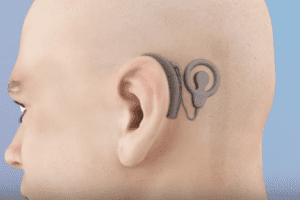
Bacterial Meningitis in Children Linked To Cochlear Implants. Dear Healthcare Provider: This is to call your attention to updated information on the risk of bacterial meningitis in children with cochlear implants, and to provide recommendations for decreasing the risk. A new CDC/FDA study has shown that children with cochlear implants with a positioner remain at increased […]

Bacterial Meningitis in Children Linked To Cochlear Implants. Dear Healthcare Provider: This is to call your attention to updated information on the risk of bacterial meningitis in children with cochlear implants, and to provide recommendations for decreasing the risk.
A new CDC/FDA study has shown that children with cochlear implants with a positioner remain at increased risk of bacterial meningitis caused by Streptococcus pneumoniae beyond 24 months post-implantation. Cochlear implants with a positioner were manufactured only by Advanced Bionics Corporation. None have been implanted since July, 2002.
The new study, published in Pediatrics, (February 2006, Vol. 117, Issue 2, http://pediatrics.aappublications.org/) followed the same cohort of children identified in an earlier CDC/FDA study for an additional 2 years.
After 24 months post-implantation, children with cochlear implants with a positioner continue to be at greater risk of developing bacterial meningitis than children with cochlear implants with no positioner or children in the general population.
Six children developed meningitis after 24 months post-implantation. All of those children had cochlear implants with a positioner.
These findings underscore the importance of continued monitoring and prompt treatment of bacterial infections in children with cochlear implants beyond two years post-implantation, particularly among children whose implants have a positioner.
It is still unknown whether the risk of meningitis in patients whose implants have a positioner might be reduced if the implant were removed or replaced by a model that does not have the positioner.
Any potential benefits of explantation surgery must be weighed against the risks for operative complications, including perioperative meningitis. The present study concludes that there is currently insufficient information to support a recommendation for elective surgery to explant devices with a positioner.
Recommendations to decrease the risk of meningitis in cochlear implant recipients
These recommendations have not changed from the 2003 recommendations.
Follow CDC’s vaccination recommendations. CDC has issued recommendations about which vaccines cochlear implant patients should receive and when the vaccines should be given. These vaccine recommendations continue to apply to all children with a cochlear implant, with or without a positioner, and all potential implant recipients.
Healthcare providers and families should review vaccination records of current and prospective cochlear implant recipients to ensure that the patient is current on all the CDC recommended vaccinations. These recommendations are available on the CDC’s website at www.cdc.gov/nip/issues/cochlear/cochlear-gen.htm.
Recognize the signs of meningitis early. Cochlear implant recipients, along with their families, educators, daycare and healthcare providers, need to be aware of the signs of meningitis. This can help ensure early detection and treatment of this life-threatening illness.
Early intervention is vital in successfully treating the infection and minimizing permanent neurological damage. Early signs of meningitis include high fever, headache, stiff neck, nausea or vomiting, discomfort looking into bright lights, and sleepiness or confusion. A young child or infant with meningitis might be sleepy, cranky, or eat less.
Diagnose and treat middle ear infections promptly. In some of the meningitis cases reported to FDA, cochlear implant recipients had signs of middle ear infection (otitis media) prior to surgery or before the meningitis developed. For this reason, healthcare providers should diagnose and treat otitis media promptly in patients with cochlear implants.
Consider prophylactic antibiotics. Healthcare providers should consider prophylactic antibiotic treatment perioperatively in children receiving cochlear implants.
Advice to Patients with Cochlear Implants can be found at http://www.fda.gov/cdrh/medicaldevicesafety/atp/020606-cochlear.html.
Background information
The original CDC/FDA article on this topic was published in the July 31, 2003 issue of The New England Journal of Medicine (http://content.nejm.org/cgi/content/full/349/5/435).
The original FDA Notification on the Risk of Bacterial Meningitis in Children with Cochlear Implants, which was last updated on September 25, 2003, can be found at http://www.fda.gov/cdrh/safety/cochlear.html. The 2003 Notification includes additional information on the background of this issue not included in this update.
The 2003 CDC/FDA study assessed the risk of meningitis among 4,264 children under the age of six at the time of implantation. The focus of the investigation was young children because they account for the majority of known meningitis cases and represent the population that now receives a large proportion of cochlear implants.
The study showed that children with cochlear implants are at greater risk of developing bacterial meningitis than children in the general population and that cochlear implants with electrode positioners were associated with a greater risk of developing meningitis than implants without positioners.
The study was unable to determine how the positioner might increase the risk of developing meningitis.
Reporting cases of meningitis in cochlear implant recipients
We encourage you to report cases of meningitis in cochlear implant recipients. You can report cases directly to the device manufacturer or you can report them to MedWatch, FDA’s voluntary reporting program. You may submit reports to MedWatch one of four ways: online at http://www.fda.gov/medwatch/report.htm; by telephone at 1-800-FDA-1088; by FAX at 1-800-FDA-0178; or by mail to MedWatch, Food and Drug Administration, 5600 Fishers Lane, Rockville, MD 20857-9787.
Contacting FDA
If you have questions about this notification, please contact Nancy Pressly, Office of Surveillance and Biometrics (HFZ-510), 1350 Piccard Drive, Rockville, Maryland, 20850, Fax at 301-594-2968, or by e-mail at phann@cdrh.fda.gov. You may also leave a voice mail message at 301-594-0650 and we will return your call as soon as possible.
FDA medical device Public Health Notifications are available on the Internet at http://www.fda.gov/cdrh/safety.html. You can also be notified through email on the day the Notification is released by subscribing to our list server. To subscribe, visit: http://list.nih.gov/archives/dev-alert.html.
Sincerely yours,
Signature of Dan Schultz
Daniel G. Schultz, MD
Director
Center for Devices and Radiological Health
The personal injury attorneys at Parker Waichman offer free, no-obligation case evaluations. For more information, fill out our online form or call 1-800-YOURLAWYER (1-800-968-7529).


